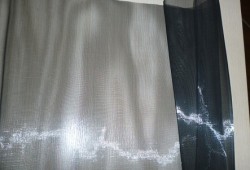
Molybdenum Mesh
Molybdenum mesh is a high-performance material valued for its high melting point, thermal conductivity, and strength at elevated temperatures, making it ideal for extreme environments where most metals fail.
Key Properties of Molybdenum Mesh:
- High Melting Point (2,623°C / 4,753°F)
– Second only to tungsten among common metals, suitable for ultra-high-temperature applications.
- Excellent Thermal & Electrical Conductivity
– Used in vacuum furnaces, electronics, and thermocouples.
- Low Thermal Expansion
– Maintains dimensional stability under rapid heating/cooling (critical in semiconductors & aerospace).
- Good Corrosion Resistance
– Resists non-oxidizing acids (HCl, HF) but oxidizes in air above ~600°C (requires inert/vacuum environments).
- High Strength at Elevated Temperatures
– Retains structural integrity better than tungsten at 1,200–1,600°C.
- Moderate Density (10.2 g/cm³)
– Lighter than tungsten, useful in weight-sensitive high-temperature applications.
Common Applications of Molybdenum Mesh:
- High-Temperature Furnaces & Vacuum Systems
– Heat shields, sintering trays, and furnace components (Mo does not outgas in vacuum).
– Thermocouple sheaths for molten metal monitoring.
- Electronics & Semiconductors
– Sputtering targets for thin-film deposition (OLEDs, solar cells).
– Electrodes in glass melting & LED manufacturing.
- Aerospace & Defense
– Rocket nozzles, missile components, and jet engine parts.
– Thermal protection systems (due to heat resistance).
- Industrial & Chemical Processing
– Molten metal filtration (Zn, Al, Cu alloys).
– Corrosion-resistant screens in acid environments.
- Medical & X-ray Equipment
– X-ray anodes & radiation shielding (alternative to tungsten).
Comparison: Molybdenum vs. Other Refractory Metal Meshes:
| Property | Molybdenum (Mo) | Tungsten Mesh | Tantalum Mesh | Zirconium Mesh |
| Melting Point | 2,623°C | 3,422°C | 2,996°C | 1,852°C |
| Density | 10.2 g/cm³ | 19.25 g/cm³ | 16.6 g/cm³ | 6.5 g/cm³ |
| Oxidation Resistance | Poor (above 600°C) | Poor (above 500°C) | Excellent | Good |
| Thermal Conductivity | Best | High | Moderate | Low |
| Cost | Moderate | Very High | High | High |
Types of Molybdenum Mesh:
– Pure Molybdenum (Mo ≥99.95%) – Standard for high-temperature use.
– Molybdenum-Lanthanum (Mo-La) Alloy – Improved creep resistance.
– TZM Alloy (Mo-0.5%Ti-0.1%Zr) – Higher strength at extreme temps.
Available Product Forms:
Molybdenum wire cloth(thin) and crimped woven mesh(thick)
Advantages of Molybdenum Mesh:
✔ Best balance of heat resistance & workability (easier to machine than tungsten).
✔ Superior thermal conductivity among refractory metals.
✔ More cost-effective than tungsten for many high-temp applications.
Disadvantages
❌ Oxidizes in air above 600°C (requires inert/vacuum environments).
❌ Brittle at room temperature when the mesh is thick (can crack under bending stress), but it will become flexible when it is thin.
❌ Not biocompatible (unlike titanium or zirconium).
 +1 206 890 7337
+1 206 890 7337 sales1@nickel-wiremesh.com
sales1@nickel-wiremesh.com